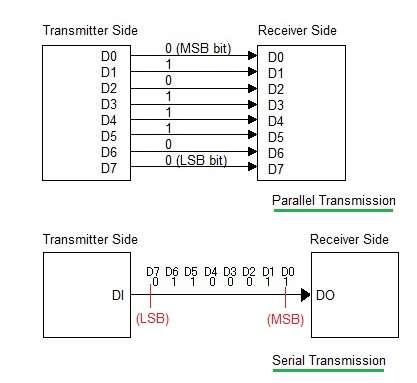Serial Interface: Advantages and Disadvantages
Advertisement
This page covers the advantages and disadvantages of Serial Interfaces. It will discuss the benefits and drawbacks of using them.
What is a Serial Interface?
In serial communication, data bits are transmitted one after the other in a sequential manner using a single communication channel. An example of a serial interface is RS-232, which is a point-to-point and asynchronous interface. It’s commonly used for communication between devices, such as Data Terminal Equipment (DTE) and Data Communication Equipment (DCE). The protocol uses a start bit and stop bit for data communication.
Serial interfaces can have multiple lines, but only one line is typically used for data communication.

There are two primary methods in serial communication: synchronous and asynchronous.
- Synchronous Communication: Blocks of data (or characters) are transferred at a time.
- Asynchronous Communication: Single bytes (or bits) are transferred at a time.
Special Integrated Circuits (ICs) like UART (Universal Asynchronous Receiver/Transmitter) and USART (Universal Synchronous/Asynchronous Receiver/Transmitter) are used for this type of communication. Many microcontrollers, like the 8051, have built-in UART chips. PISO (Parallel-In Serial-Out) and SIPO (Serial-In Parallel-Out) shift registers are used to convert serial data into parallel data and vice versa.
Benefits (Advantages) of Serial Interface
Here are the key benefits of using a serial interface:
- Reduced Cost: It requires fewer conducting wires, which lowers the overall cost of the interface.
- Long Distance Communication: Supports data communication over longer distances.
- Simple Interface: Uses fewer wires, often just one, resulting in a simpler interface between transmitting and receiving devices or ICs. This also makes it easier to implement.
Drawbacks (Disadvantages) of Serial Interface
Here are the main disadvantages of using a serial interface:
- Slower Transmission Speed: Uses fewer lines for transmission between devices, resulting in slower transmission speeds.
- Overhead: Introduces an overhead of about 20% beyond the useful information. This leads to a waste of bandwidth meant for data transmission due to the additional, non-essential data.
Advertisement
 RF
RF






